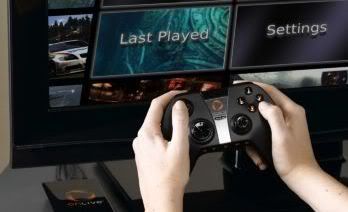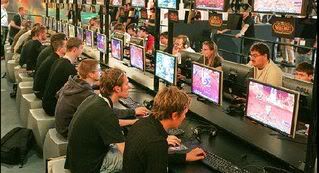Predictions for Gaming Post-E3 2010
By eljay 5 Comments

Welcome, to the world of tomorrow! With E3 right around the corner, everyone's brains are spinning with visions of the future. Where can one even begin to speculate what and how we'll be playing our favorite games in the years to come? Here are the concepts that I think will have a huge part to play in the upcoming years.
The Expansion and Domination of Digital Distribution

The shift has already begun on the PC, and will make the move to consoles over the next few years as the console makers continue to expand their marketplace networks. Steam has been nothing short of a revolution for game distribution in that it benefits both the developer and consumer of the products of the video game industry. I would not be surprised if at least one of the next generation's consoles consists entirely of digital software. While consumer response to the vision of the PSP Go has been a disaster, this problem is due more to an extremely high cost of entry relative to the traditional PSP which Sony is simultaneously supporting.
Gamers will go where the games they want to play are, no matter how these games are distributed, so the decision to switch to digital distribution lies entirely in the hands of the industry. Removing the need to physically develop and distribute product to consumers is a tantalizing offer for the industry and is going to happen sooner than later. This will also lead to the downfall of the physical retail space since people won't be leaving their homes to buy games. Dedicated game retailers like Gamestop will be forced to change their business model or close shop in much the same way Blockbuster was forced to this decade due to overwhelming competition from Netflix. Most gamers, myself included, may prefer to have the physical game sitting on their shelf, but I will never boycott a game I want to play if I'm not given the option. The questions that are up in the air regarding digital distribution's dominance are how quickly this massive shift happens and if retail outlets will figure out what to do to compensate before inevitability runs them out of town.
Cloud Computing and the Death of the Console

Of course, it is entirely possible that in the coming years developers won't actually be distributing product at all, but instead only the rights to their product via online streams. OnLive is certainly not the first attempt to do this in the industry, but it has the unique characteristic of competing against the console manufacturers rather than working with them as an add-on like was done for previous attempts such as GameLine and Sega Channel. On-demand video games, where players rent the rights to play for a few hours or days at a time may or may not represent greater profit opportunities, but it would mean the death of consoles since all the hardware will be stored in giant computer banks outside the player's homes. A low cost of entry for the consumer and flexible purchasing options might be hard to resist, but who in the corporate space is actually going to go for it? OnLive has a lot of hurdles to overcome both with the technology and creating a more attractive pricing model, but it might be the start the industry needs to get moving towards hardware consolidation. With the growth in popularity of smartphones as gaming platforms, I foresee the big breakthrough coming when a company provides the consumer with a unified gaming experience, allowing them access to their games at home and on the go through a single service.
Expansion of Motion Controls and Next Steps for Interaction

We're still a ways off from fully-realized virtual reality, but the next step will be using technology to get us as close to the experience as possible, done through simulation and a little trickery. There are a lot of companies that have their R&D teams hard at work trying to figure out what consumers will fall head over heels for in the future, with the 3DS, Move, and Natal all ready to make their presence known over the next few days. How far into reality do we actually want to take our gaming experiences? The Wii was a revolutionary first step, but do gamers really want an entire platform based around the fact that the controller for every single game they own is their body? The classic controller/mouse and keyboard will never completely go away, and developers will need to tread a fine line to prevent over saturating the market with motion-based games, lest they repeat the boom and bust cycle currently going on in the music genre.
3D gaming is a whole other issue. Currently a resurrected fad of the film industry, 3D gaming is in the nascent stages and the future importance of it is heavily dependent on other factors. Until a considerable portion of the gaming public purchases 3D televisions, the concept will never catch on in homes enough to be relevant, but should the 3DS successfully integrate gaming and 3D in an engaging way, and the concept not fizzle and die in our movie theaters, the public may desire an expansion of the concept in other ways provided game developers do not simply utilize it as a gimmick or attention grabber.
Our Second Lives Become More Important Than Our First

This one scares me the most but I feel is just as realistic as the other items above. World of Warcraft took the MMO genre out of a niche and into the mainstream, and while it's success has stagnated the genre since then, the next ten years will probably be a different story. I know very few gamers with access to a decent PC who have not logged at least a couple months in Azeroth, and I myself spent an upwards of four years raiding Blizzard's dungeons with 39 or 24 of my closest online buddies on a nightly basis, so I know very well the grasp such a title can have on a person's life.
MMO games as they are designed are generally not a casual experience, as players invest hundreds of hours on their avatar and become genuinely attached to their in-game successes and failures. Initially I loved playing WoW because it forced my gaming time to incorporate other people into my activities, but I came to the realization that while I was spending time with other people, the total time I spent on gaming far exceeded anything I had done in the prior fifteen or so years I had been playing games. Yes, I played with people a lot, was a guild and raid leader, but I also spent a lot of time leveling, farming, and standing around afk in Ironforge or Orgrimmar by myself.
I worry that if MMO games become more popular, real life as we know it will become less important. People won't go out for their entertainment when it is much cheaper and enjoyable to sit at home spending time in their virtual worlds every night, not to mention much easier to make new friends. The market for virtual goods and properties grows every year, heck someone bought a piece of digital property for $330,000, so if demand is growing I can only imagine more people are getting interested in inhabiting these virtual spaces. Gaming is a healthy and enjoyable hobby, but I wouldn't wish it on the world for all of us to be MMO addicts at the same time.
Summary
So the net result of my predictions for E3 and the years to follow? Video games will continue to expand their influence and player base over the coming years. In the next five to ten years we'll be firmly at a point where there is something for everyone and the options for accessing these games will come in many different shapes and sizes. The first big hurdle to climb is the expansion of persistent broadband connections, and once that is accomplished the world of gaming can quickly be provided to anyone who wants it. I don't think traditional gaming as we know it will die out any less than it already has, as the growth of one side of the market does not necessarily contribute to the decline of the other.
What I am most unsure about is whether or not one or two companies will emerge as the dominant players. I strongly believe that we are heading towards a future of universally uniform hardware, either through online streaming or a physical console, but what remains to be seen is how that will affect the development and distribution of games. Should one corporation pull off a Google-sized coup of the console market through OnLive or similar product that creates a mainstream sensation, we could be looking at a stymieing of development and distribution of titles that is the stuff of our worst EA monopoly nightmares. On the other hand, should multiple companies emerge as players and compromise on a universal platform we could have a very open marketplace where indie developers are able to freely step up and actively distribute their product to a waiting public. I suppose on that case we'll just have to wait and hope for the best, and remember that we the consumers will vote with our wallets which vision of the future we truly want.

5 Comments